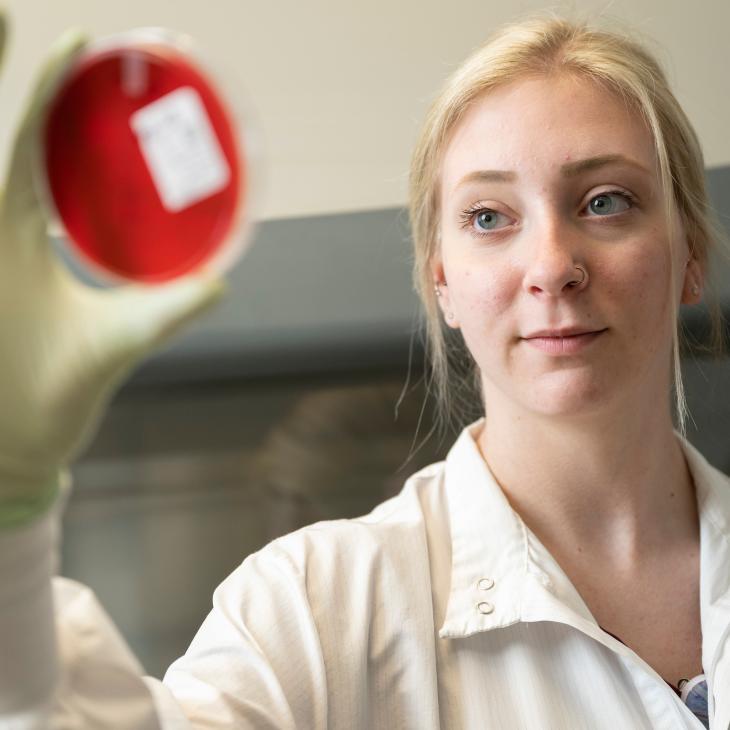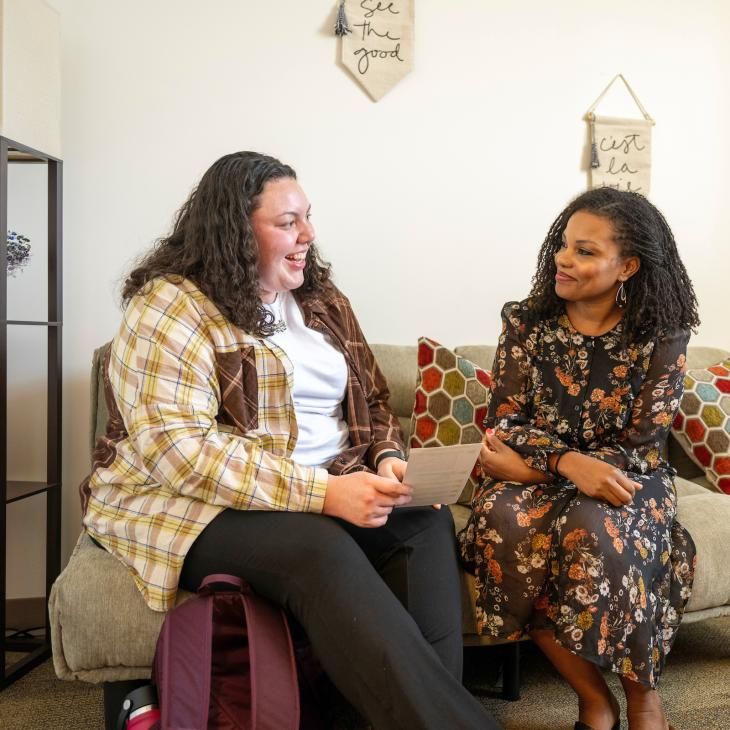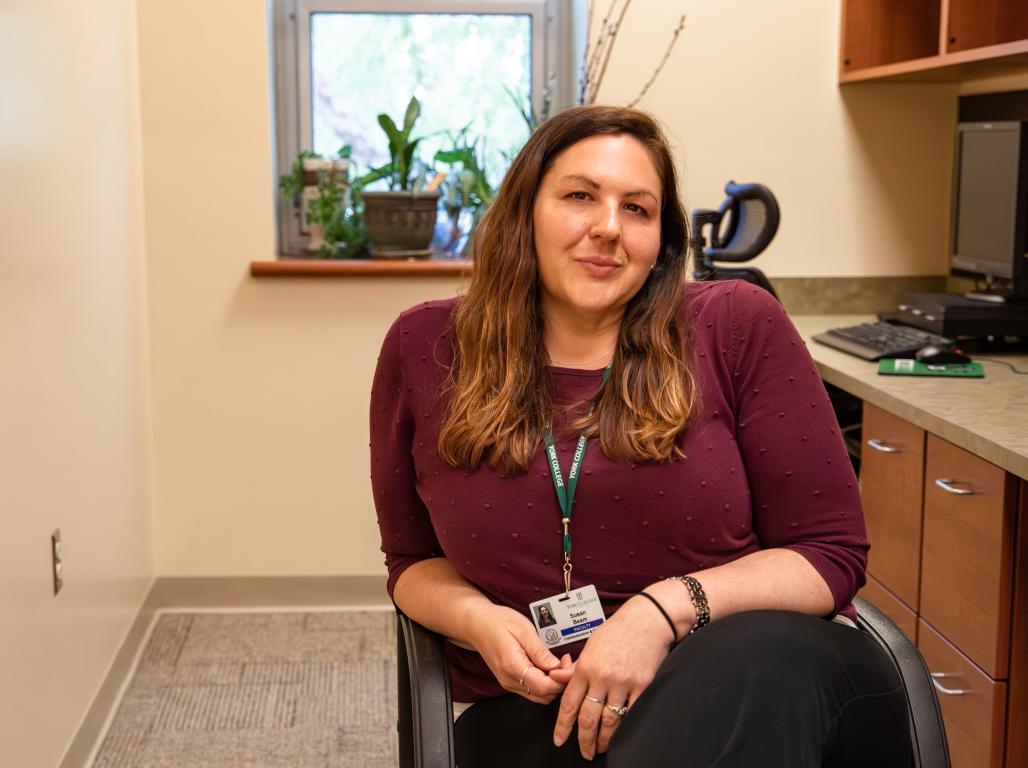Medical Humanities

Program Type
B.A.
Est. Time to Complete
4 Years
School
School of the Arts, Humanities, Education, and Social Sciences
Delivery Mode
On Campus

Explore the human side of healthcare and medicine. Prepare for med school.
The healthcare sector is evolving, and York College of Pennsylvania is changing with it. With a greater focus on wellness and a comprehensive understanding of patient needs, our Medical Humanities major uniquely prepares students to meet a modern standard of patient care.
As one of only 22 colleges across the United States and Canada to offer a Bachelor of Arts (B.A.) in Medical Humanities degree program, YCP takes pride in our ability to provide education on the leading edge. This broadened approach is quickly becoming the preferred pathway to medical school. Medical Humanities majors at York College learn to think critically about how ethics, societal trends, community demographics, patient spirituality, and the measurements we use to define wellness influence healthcare.
Ready to gain an understanding of medicine that is rooted in both science and a holistic view of health and healing? Explore the Medical Humanities degree program!
About the Bachelor of Arts in Medical Humanities
Requirements
York College’s Medical Humanities degree program features a wide range of courses that enable you to deepen your knowledge of the intersection of medicine, humanity, and society. While you learn broadly about illness and patient treatment, your studies focus on the ways medical conditions impact individuals, families, and communities as a whole.
You receive an intentionally interdisciplinary education that fulfills the requirements of most medical schools. Balancing technical knowledge with a strong liberal arts foundation, the program allows you to develop the tools to evaluate and analyze wellness metrics and the ability to utilize disparate techniques of critical thinking and textual interpretation.
As you consider your interests, preferences, and goals for your future career, you may wish to add a minor alongside your Medical Humanities major. Some of your options include:
Explore more minors and dual major opportunities, or talk with one of York College’s career counselors if you aren’t sure which degree program is right for you.
Admissions and Aid
Admission to York College is straightforward, thanks to the many resources that can help you navigate the process. Review undergraduate admissions to find out more about applying.
Our financial aid tools can assist you in making decisions about how to fund your degree. Aid options include scholarships, grants, work-study, and traditional student loans. Learn more about York financial aid.
Earn a B.A. in Medical Humanities at York College of Pennsylvania
Develop a holistic understanding of patient care in the Medical Humanities major — your pathway to a lifelong career in healthcare.
Medical Humanities Careers
Those with a medical humanities degree are in high demand as the healthcare and medical sectors rapidly evolve. York College graduates work in hospitals, pharmaceutical companies, physician’s offices, outpatient clinics, universities, and other healthcare settings.
Moreover, a bachelor’s degree in medical humanities can provide a competitive edge in these and related industries, and students who further their education in graduate or medical school can explore additional options.
Earning a Medical Humanities degree from York College empowers students to find work that offers personal satisfaction and contributes to community wellness. Since our students graduate with a strong background in both the sciences and the liberal arts, they have the flexibility to build a career that aligns with their areas of interest — whether that means research, communication, education, or a combination of multiple skill sets.
Salary and Outlook
Salary potential for individuals with a medical humanities degree depends on where they choose to work and the type of job they pursue. According to the U.S. Bureau of Labor Statistics (BLS), Health Education Specialists and Community Health Workers earn a median salary between $51,030 and $63,000 per year. Meanwhile, Medical and Health Services Managers make an average of $117,960 per year, and Medical Scientists earn an average of $100,590 annually.
BLS data shows that job growth in areas like medical and health services, healthcare, and community health is significantly higher compared to other fields nationwide.
York College Medical Humanities majors can work with their advisors and the Career Development Center to select electives that tailor their education to their desired future careers.
Medical Humanities Internships & Independent Study
Hands-on experience is at the core of York College’s Medical Humanities bachelor’s degree program. Students collaborate and network closely with faculty members whose research and expertise align with their interests. While not required, we encourage all Medical Humanities majors to explore independent study or internships with both faculty advisors and the Career Development Center to identify high-quality work sites.
Visit the internship page to learn more.
Student Clubs & Campus Engagement
As a Medical Humanities major at York College, your experience extends far beyond the classroom. Here, you can form strong bonds with individuals in your major and other academic groups. York College of Pennsylvania boasts a vibrant campus life with student clubs and organizations spanning a wide range of passions – including the Pre-Medical and Allied Health Society, club sports, and various campus recreation activities, you can help promote health and wellness through awareness, education, and prevention, all while building community.
Skills You’ll Get in the Medical Humanities Program
York College’s Medical Humanities majors acquire broad medical knowledge, along with marketable, transferable professional skills that make them valuable employees across industries and competitive candidates for graduate and medical school.
The Medical Humanities program teaches students to be empathetic toward others and to approach problems from different angles. These abilities prepare them to analyze situations from historical, cultural, and social contexts, giving the sciences a human dimension.
Students gain a unique blend of functional and job-ready skills, including:
- Communication
- Critical thinking
- Ethical decision-making
- Interpersonal skills
- Knowledge of medical and healthcare fields
- Research and analysis
- Technical writing
Medical Humanities Courses
Explore the human aspects of medicine and healthcare in courses like health law and policy, psychology, bioethics, molecular biology, sociology, and more. Develop a holistic perspective of human health as you take discipline-specific courses and liberal arts foundations. View the program requirements to learn more about the curriculum.
| Course Name | Course Code | Credits |
|---|---|---|
| Introduction to Molecular Biology | BIO 150 | 4 Credits |
| Genetics | BIO 240 | 4 Credits |
| Bioethics | PHL 346 | 3 Credits |
| Health Law and Policy | PS 357 | 3 Credits |
Careers in the Medical Humanities
As a graduate of York College’s Medical Humanities major, you can pursue a wide variety of career opportunities. Some of your options may include:
Physician
Medical Administrator
Patient Advocate
Health Educator
Community Health Worker
Clinical Researcher

Build your dream career, one day at a time.
This is day one. From your first semester on campus through graduation day, York College offers expert advice, professional development opportunities, and personalized support to help you navigate the choices that influence your future.
Explore resources for a successful college experience:
Frequently Asked Questions
A medical humanities degree is a multidisciplinary degree that combines the fields of humanities, social sciences, STEM, and the high-demand hallmarks of a liberal arts education. Medical Humanities majors at YCP gain a broad understanding of the science at the root of medicine while diving into the ‘human’ side of healthcare, including how it impacts individuals, communities, families, and society as a whole.
The medical humanities are important because they provide essential insights into the conditions and illnesses that affect our lives. This subject goes beyond the “how” of biology and genetics and examines the “why” behind healthcare’s role in society.
Medical Humanities majors at York examine issues like ethical responsibility and professionalism in the medical field, as well as the impact of overall wellness and community influences.
A medical humanities degree is extremely versatile and positions you for opportunities in healthcare and beyond. Graduates of York College’s Medical Humanities program have gone on to careers in hospitals, pharmaceutical companies, physician’s offices, outpatient clinics, universities, and more.
Not at all! While the Medical Humanities major is ideal for those who wish to work in the medical field, it also allows for a broader range of professional opportunities.
The program is a high-quality option if you want to explore significant questions regarding medical care, mortality, illness, and justice — whether your career path leads you into healthcare, community health, wellness education, or even med school or graduate studies.
Meet the Faculty
View All FacultyMedical Humanities in Action
View All NewsRelated Programs
Behavioral Sciences
The Behavioral Sciences Major offers a multidisciplinary exploration of human behavior and the social forces that shape it. Students gain a deep understanding of individual and group behavior, social structures, and the cultural and systemic influences that drive change. This program emphasizes the development of critical thinking, problem-solving, and cultural competence—skills essential for addressing real-world challenges and advancing social justice in diverse communities.
Healthcare Administration
The field of healthcare has plenty of career opportunities, and they don’t all require a degree in medicine. Professionals in healthcare administration support both patients and providers every day by keeping medical services running smoothly.
Premedical Sciences
York College of Pennsylvania’s Bachelor of Science (BS) in Premedical Sciences degree program prepares students academically and holistically for competitive pre-professional programs in medicine. This premed major program offers a comprehensive education in the essential sciences and the foundation necessary for the rigors of medical school, dental school, PA school, pharmacy school, and more.








